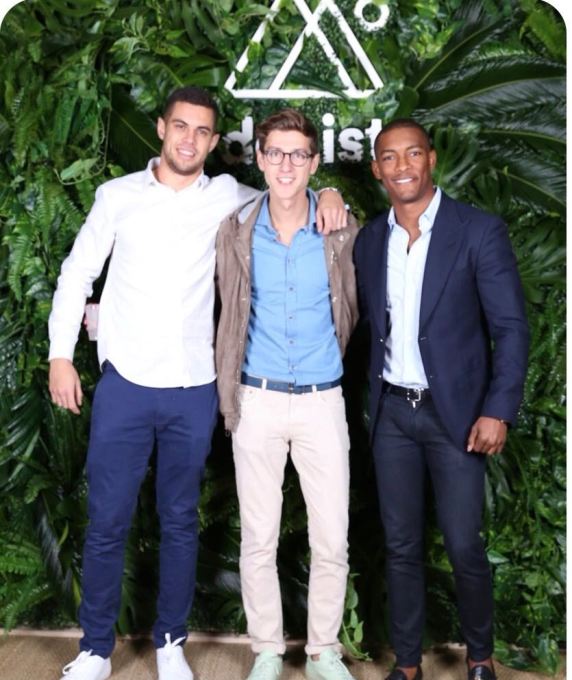At age 27, Jordan Fudge is quietly making a splash in the VC world.
Fudge is the managing partner of Sinai Ventures, a multi-stage VC fund that manages $100 million and has more than 80 portfolio companies including Ro, Drivetime, Kapwing, and Luminary. His 2017 investment in Pinterest — a secondary shares deal from his prior firm that was rolled into Sinai when he spun out — will have returned the value of Sinai’s Fund I by itself once the lockup on shares expires next week.
Fudge and co-founder Eric Reiner, a Northwestern University classmate, hired staff in New York and San Francisco when Sinai launched in early 2018. Today, they’re centralizing the team in Los Angeles for its next fund, a bet on the rising momentum of the local startup ecosystem and their vision to be the city’s leading Series A and B firm.
Fudge and Reiner have intentionally stayed off the radar thus far, wanting to prove themselves first through a track record of investments.

A part-time film financier who also serves on the board of LGBT advocacy non-profit GLAAD, Fudge describes himself as an atypical VC firm founder, an edge he’s using to carve out his niche in a crowded VC landscape.
I spoke with Fudge to learn more about his strategy at Sinai and what led to him founding the firm. Here’s the transcript (edited for length and clarity):
Eric Peckham: Tell me the origin story here. How did Sinai Ventures get seeded?
Jordan Fudge: I was working for Eagle Advisors, a multi-billion dollar family office for one of the founders of SAP, focused on the tech sector across public markets, crypto, and eventually VC deals. Two years in, I pitched them on spinning out to focus on VC and they seeded Sinai with the private investments like Compass and Pinterest I had done already, plus a fresh fund to invest out of on my own. It was $100 million combined.
Peckham: Hold on — it’s not common even amongst investors who are doing a great job at a family office or a bigger firm that they spin out with $100 million dollars after two years. Especially when you were in your mid-twenties. Walk me through how this happened.
Fudge: One of the first things I did in that job was pitch them Nvidia at a very early point, under $50 a share. They put some money in as a public equity play and came to realize how big the opportunity in tech was at that moment.
I had worked at 20th Century Fox previously and had a clear sense of how tech companies were becoming media conglomerates. I said we should invest in Netflix, and in Facebook because I saw Instagram’s ascent towards being the future of advertising, and so on with Apple and Amazon. It was the FAANG investment strategy before it was called that.
Those wins gave me some credibility despite my age. They realized there was a whole lot of opportunity in tech and that if there is going to be somebody looking after the sector for them, it should probably be the young guy who has a sensibility that’s more forward-thinking and less imbued with traditional analysis.
Peckham: Why spin out private tech investments as a separate firm?
Fudge: We recognized that in order to build a real venture arm you need to be more comfortable with having a public profile. That wasn’t what they wanted to do internally. Like most family offices and hedge funds, they prefer to operate quietly and keep their investment strategy guarded. It was easier to manage their needs by having me spin out.
Peckham: And when you secured their support to spin out, you reached out to Eric Reiner, who you went to Northwestern with to run the firm with you?
Fudge: Exactly. He had worked at Insight Ventures then went on to be an operator, leading innovation at Newell Brands. We had already co-invested in certain companies together (him as an angel) so we liked each other’s point of view on deals. We started exploring how to set up a fund in November 2017 and were launched a few weeks later in January.
Peckham: What was the reception among founders and other VCs when you came out of the gate as a big new fund led by two young guys?
Fudge: I think it was refreshing for a lot of people we worked with. We brought a lot of energy and were perceived as hustlers getting into top tier startups and going out of the way to help portfolio companies. You tend to stand out when you have a VC firm where everyone is in their late twenties, and that gives us a unique advantage in relating to this generation of tech entrepreneurs, who view us as peers.
Many top tier VCs introduced us to amazing companies in which we’ve been fortunate to be able to invest. It was helpful having so much capital to deploy — we could back companies early with big checks. One of the first we invested in was Carta and that was really prescient in retrospect. There was also Grin, a scooter company in Latin America, that we invested in before they got into Y Combinator.
When we started, we were between New York, San Francisco, and LA so we covered a lot of territory. Now we’ve realized that LA is really where we want to play, so it’s helpful to centralize in one place.

Peckham: Why the shift to focus more on LA?
Fudge: Well, LA’s a much bigger city and thus probably a better initial market for young companies than San Francisco. We’re seeing a lot of entrepreneurs in the Bay Area who exit their companies and move down here to start the next ones.
There’s better work-life balance and a lower cost of launching a business. Plus there’s an awakening among celebrities and leaders in the creative industries that they should be involved in supporting new startups.
From our standpoint, LA has a lot more to offer right now if you’re a young VC firm. The Bay Area is historically very crowded and NYC seems to be catching up with hedge funds and private equity firms doing more venture deals. LA right now is a place where, if you are early — and I think we are — you can make a real statement.
Peckham: Your investment scope is still global though, correct?
Fudge: We love Latin America — we’ve got a few companies there like Skydrop, Addi, and Grin which I mentioned. Eric speaks Spanish and his wife is Colombian, so he spends a lot of time throughout South America.
India is also really interesting to us: we were early backers of OkayCredit. I see a lot of opportunities in these markets, especially for B2B businesses.
Peckham: How do you generate deal flow and evaluate deals abroad as a small team?
Fudge: One of the best ways is finding the founders who have already exited in those regions. The startup investing communities tend to be very tight in developing markets, so founders who’ve exited usually have a strong pulse on deals and can be very helpful as sherpas, so to speak, providing guidance on things like consumer behavior and cultural differences to watch out for.
Peckham: What thesis or interest areas are guiding Sinai’s investing right now? Back in May, you shared a short paragraph about your investment thesis within the media realm for a post I did.
Fudge: Entertainment is always interesting to me. “Transmedia” companies that are really changing the definition of what media can be, like Brud’s @lilmiquela are particularly exciting.
Health and wellness has our attention too. We invested in a company called HealthHouse, which Bobby Maylack co-founded with Patrick Schwarzenegger. They assembled a dream team of athletes and celebrities like Russell Westbrook, Odell Beckham, and Kevin Hart to create a chain of boutique rowing studios, a la Rumble or SoulCycle. Their LA concept is quickly becoming a hot spot in West Hollywood.
It being LA, we’ve seen a lot of cannabis but remain cautious about that space. We invested in Dosist because they prioritized the health benefits of the product. Gunner runs the company like a medical device company, which I think has helped them during this recent vaping crisis.
Peckham: Speaking of the traditional entertainment industry, you used to work at Fox Studios and have a foot in the game personally with your own production company.
Fudge: Yes, I raised a separate $100 million fund called NewSlate Ventures that invests in independent films that we sell to streaming giants from the technology industry like Netflix, Apple, Amazon, Quibi, etc.. As a VC I know these companies are prone to buying IP assets as an entry point to new markets, so we’re making smaller budget movies with A-list talent attached that fits the profile of entertainment that streamers want.
When someone like Netflix buys your film, you get an exit like you would get investing in startups, and although it’s a “cost-plus” return rather than a big multiple, the timeline to exit is usually under 12 months. I can recycle that capital and keep making more movies. For me, it can sometimes feel like a hobby since I went to film school and love the challenge of developing something from idea stage to a finished product.

Peckham: Does work for New Slate and Sinai ever intersect in terms of film talent getting involved in your portfolio companies or a portfolio company’s product getting placement in a film?
Fudge: Absolutely. I think if you’re going to be a VC in LA you should have a certain proximity to Hollywood talent. Part of what many founders want from their LA-based investors is an ability to access that world for them.
Funnily enough, investing in Sean Parker and Prem Akkaraju’s company Screening Room whose investors are people like Spielberg, Peter Jackson, and Martin Scorsese led to me connecting with some very high profile Hollywood directors, one of which we’re currently developing a project with. Often times the Hollywood people we intersect with want someone to demystify tech investing for them and we’re happy to help.
Peckham: How does your entertainment background shape your investing, or your ambitions in general as a VC?
Fudge: I was born and raised in Los Angeles. My family worked in the entertainment business during a time of a lot of digital disruption, so I watched firsthand as technology both decimated and reinvented the music industry. It fundamentally changed the consumer’s relationship with media.
The influence that a bit of software like Napster or Spotify could have on the economics of the entire recording industry really sparked my interest, and I started to pay closer attention to other areas where people were using tech to approach problems differently and restructure markets. It was then that I started thinking about how to take advantage of those changes through investing.
Peckham: Do you have a certain framework for evaluating founders, or certain aspects you place emphasis on?
Fudge: I think founder-market fit is extremely important. I place a lot of emphasis on that.
Perhaps a more important criteria is backing morally and ethically upright founders; venture capitalists have the unique ability to reshape capitalism and the role of corporations by backing founders who are committed to building responsible businesses and healthy corporate cultures. I think you look at Uber and WeWork, or worse, Theranos and a lot of those companies’ issues seem to stem from backers who didn’t do their qualitative diligence on the founders and the types of organizations they were creating.































Comment